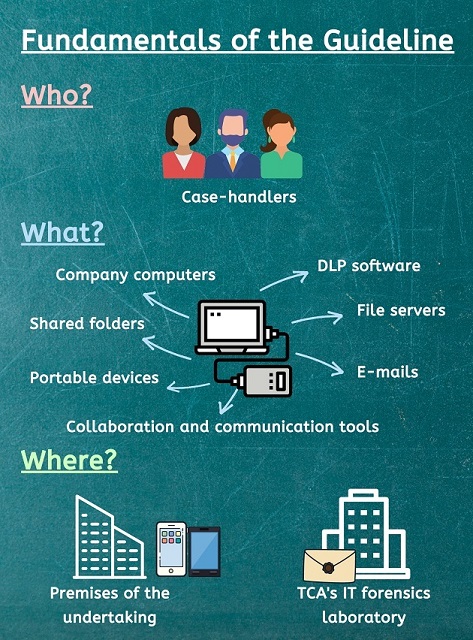It appears that dawn raids, one of the significant tools of Turkish Competition Authority (TCA) for obtaining information and documents from undertakings, will remain as a hot discussion topic in competition law agenda. To provide a quick recap, amendments enacted in last June granted the TCA officials the authority to examine digital data during the course of dawn raids. For those who would like to fresh their memories in relation to said amendments and re-visit our initial assessments, we share the link of our Mondaq article here.
The details of the authority of TCA officials to examine all types of data and documents kept in electronic media and information systems were silently placed on TCA's website last week. Guideline on the Examination of Digital Data in Dawn Raids ( Guideline) provides explanations concerning the procedure to be followed in the dawn raids, a process that carries utmost importance when the amount and processing media of digital data are taken into consideration. Although the wording (and potential applications) of the Guideline is evidently expected to bring up heated discussions, we believe it is important to evaluate the regulations introduced with the Guideline from an objective perspective.

Who can conduct examinations and what can be seized?
In light of the explanations provided in the Guideline, case-handlers, composed of Chief Competition Experts, Competition Experts and Assistant Competition Experts, have the authority to conduct inspections within the digital environments of the undertakings and in the hardware where digital data is stored. Said environments include information systems such as PCs, laptops, servers and portable devices as well as storage tools including CDs, DVDs, USBs, external discs, back-up records and cloud systems.
While inspecting the relevant systems, case-handlers may utilize software and hardware used by the undertaking or software/hardware they brought to the dawn raid that allow searching within the digital data of the undertaking.
Can TCA examine personal phones, tablets, etc?
The first step foreseen in the Guideline is for the case-handlers to have a quick look at the portable devices (i.e. mobile phones, tablets) in order to determine whether relevant devices contain data of the undertaking. Having said that, the Guideline does not provide any explanation in relation to the scope of referred concepts, namely "data of the undertaking" and "quick examination". In case the device contains data, which can be associated with the undertaking, the device will be subject to an IT forensics examination regardless of its ownership status (personal or work phones) or whether the undertaking pays the relevant phone bills. In other words, personal phones containing data of the undertaking (applications, correspondences, e-mails etc.) will also be subject to examination.
During the course of the inspection, case-handlers will copy and examine data in storage devices of the TCA. To copy data, physical or logical images of hard drives, disk partitions or digital data may be acquired. Upon conclusion of the inspection, case-handlers will take copies of data deemed relevant and necessary. On the other hand, upon conclusion of the inspection case-handlers are required to wipe data copied to storage devices of TCA and assure that data is deleted and cannot be recovered.
Is it possible to examine the devices outside the premises of the undertaking?
Priority of the case-handlers is to conclude the dawn raid at the premises of the undertaking. On the other hand, the Guideline also states that if deemed necessary, the inspection may also continue at the IT forensics laboratory of the TCA. On that note, mobile devices appear as an exception in relation to the inspections at TCA's premises. In light of the provisions stipulated under the Guideline, under any circumstances, case-handlers must conclude the inspection of data stored in mobile devices at the premises of the undertaking.
Three copies will be prepared for digital data which will be subject to examination at TCA's headquarters. Upon checking the hash values, which prove that copied data exactly match the original, the undertaking will receive a copy of digital data and case-handlers will take other copies to the TCA in a sealed envelope. TCA will send an invitation in writing to a representative from the undertaking for their attendance during the procedures of unsealing and examination of the data.
In case the Turkish Competition Board deems necessary, it may render a decision ruling for returning the sealed envelope to the undertaking without conducting any further examination.
Beyond doubt, publication of secondary legislation is a positive step towards governing dawn raid procedures that are of utmost importance to all undertakings, their representatives and TCA officials. However, we believe that applications of the same would serve an equally important role in the determination of the efficiency and ability of the Guideline in meeting the needs in practice. As dawn raid procedures seem to remain at our agendas for a considerable period, we recommend you to follow our works yet to come in this field for fruitful theoretical and practice-oriented discussions.
The content of this article is intended to provide a general guide to the subject matter. Specialist advice should be sought about your specific circumstances.


